Related Research Articles

Richard Bancroft was an English churchman, Archbishop of Canterbury from 1604 to 1610 and "chief overseer" of the King James Bible.
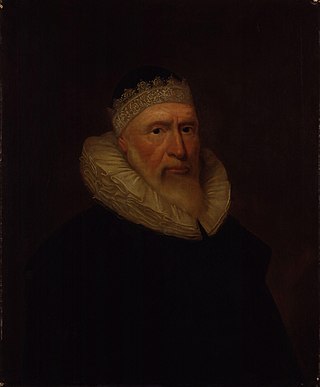
Sir Julius Caesar was an English lawyer, judge and politician who sat in the House of Commons at various times between 1589 and 1622. He was also known as Julius Adelmare.

Samuel Harsnett, born Samuel Halsnoth, was an English writer on religion and Archbishop of York from 1629.

Henry Howard, 1st Earl of Northampton, KG, was an important English aristocrat and courtier. He was suspect of being Roman Catholic throughout his life, and went through periods of royal disfavour, in which his reputation suffered greatly. He was distinguished for learning, artistic culture and his public charities. He built Northumberland House in London and superintended the construction of the fine house of Audley End. He founded and planned several hospitals. Francis Bacon included three of his sayings in his Apophthegms, and chose him as "the learnedest councillor in the kingdom to present to the king his Advancement of Learning." After his death, it was discovered that he had been involved in the murder of Sir Thomas Overbury.

Gervase Babington (1549/1550–1610) was an English churchman, serving as the Bishop of Llandaff (1591–1594), Bishop of Exeter (1594–1597) and Bishop of Worcester in 1597–1610. He was a member of the Babington family and held influential offices at the same time as his cousin Anthony Babington was executed for treason against Elizabeth I as part of the Babington Plot.
Gordon Donaldson, was a Scottish historian.
Sir Hrothgar John Habakkuk was a British economic historian.
Daniel Coxe III was an English physician and governor of West Jersey from 1687 to 1688 and 1689 to 1692.

Godfrey Goldsborough was a Church of England clergyman and bishop of Gloucester from 1598 to 1604. He was educated at Trinity College, Cambridge. He also served as a Prebendary of Worcester.
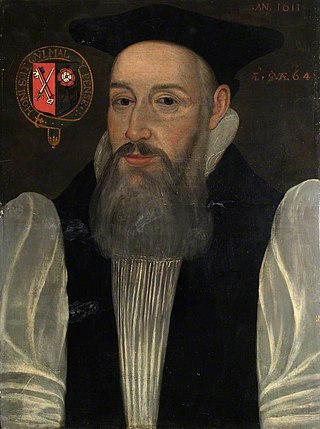
Thomas Bilson was an Anglican Bishop of Worcester and Bishop of Winchester. With Miles Smith, he oversaw the final edit and printing of the King James Bible.
James Hamilton, 1st Viscount Claneboye was a Scot who became owner of large tracts of land in County Down, Ireland, and founded a successful Protestant Scots settlement there several years before the Plantation of Ulster. Hamilton was able to acquire the lands as a result of his connections with King James I, for whom he had been an agent in negotiations for James to succeed Queen Elizabeth I.
Lancelot Browne (c.1545–1605) was an English physician.
Richard Howland (1540–1600) was an English churchman and academic, Master of Magdalene College, Cambridge, and of St John's College, Cambridge, and bishop of Peterborough.
Matthew Gwinne was an English physician.

Sir William Paddy (1554–1634) was an English royal physician.
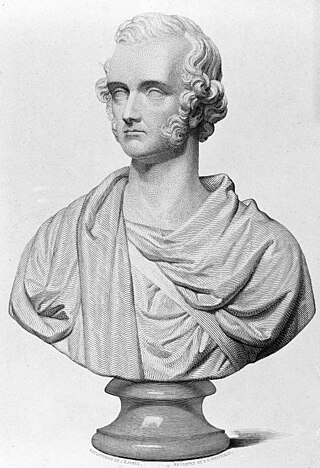
Sir James Alderson FRS was an English physician born and based in Kingston upon Hull. He was President of the Royal College of Physicians.
Noel Broxholme, M.D. (1686–1748), was an English physician.
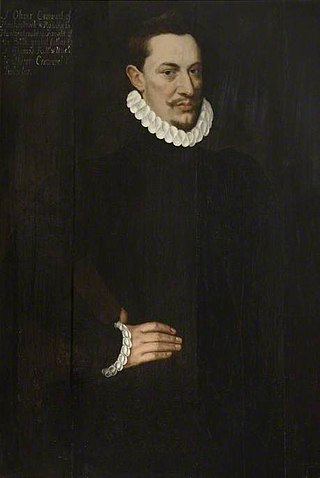
Sir Oliver Cromwell was an English landowner, lawyer and politician who sat in the House of Commons at various times between 1589 and 1625. He was the uncle of Oliver Cromwell, the Member of Parliament, general, and Lord Protector of England.
Thomas Francis was an English academic and physician, Provost of The Queen's College, Oxford and President of the London College of Physicians.
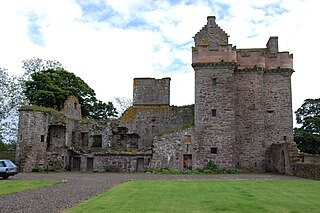
David Beaton of Melgund was a Scottish courtier and landowner.
References
- ↑ "Barnsdell or Baronsdale, William (BNSL552W)". A Cambridge Alumni Database. University of Cambridge.
- 1 2 ""Baronsdale, William"". Oxford Dictionary of National Biography (online ed.). Oxford University Press. doi:10.1093/ref:odnb/1502.(Subscription or UK public library membership required.)
- ↑ Leader, John Daniel (1880). Mary Queen of Scots in Captivity. p. 504.